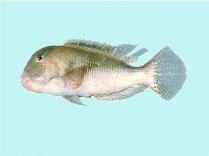| Family: |
Labridae (Wrasses), subfamily: Bodianinae |
| Max. size: |
38 cm TL (male/unsexed); max.weight: 365.0 g |
| Environment: |
reef-associated; marine |
| Distribution: |
Indo-West Pacific: Indonesia to Queensland, Australia. |
| Diagnosis: |
Dorsal spines (total): 13-13; Dorsal soft rays (total): 7-7; Anal spines: 3-3; Anal soft rays: 10-10. Body scales edged with blue giving sides uneven banded appearance. No small prominent black spot on side. A horizontally elongate dusky blotch present below centre of fin in some specimens. Head with many small orange spots on cheek, forehead crossed by 4 or 5 sets of alternating blue and orange stripes. Second prominent anterior canine in lower jaw distinctly smaller than first in adults, directed dorsolaterally and curved slightly posteriorly. 1 to 3 scales on subopercle. (Ref 9823) |
| Biology: |
Adults occur solitarily in shallow coral reefs and seagrass beds. Feed mainly on hard-shelled prey including crustaceans, mollusks and sea urchins (Ref. 9823). Oviparous, distinct pairing during breeding (Ref. 205). An excellent food fish. |
| IUCN Red List Status: |
Least Concern (LC); Date assessed: 12 April 2008 Ref. (130435)
|
| Threat to humans: |
harmless |
Source and more info: www.fishbase.org. For personal, classroom, and other internal use only. Not for publication.

